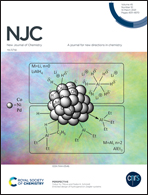Palladium nanoparticles in situ synthesized on Cyclea barbata pectin as a heterogeneous catalyst for Heck coupling in water, the reduction of nitrophenols and alkynes†
Abstract
This study develops an effective method for the in situ synthesis of palladium nanoparticles (PdNPs) using Cyclea barbata pectin as a green reducing and stabilizing reagent. The PdNP@pectin nanocomposite was well characterized by analysis techniques such as UV-vis, FTIR, EDX, XRD, SEM, HR-TEM and STEM-mapping. Crystalline PdNPs were found to be distributed in the size range of 1–25 nm with the highest frequency of 6–12 nm. PdNP@pectin exhibited excellent recyclable catalysis activity for the Heck coupling reaction in water medium. The kinetics and recyclability of nanoparticles were investigated for the catalytic reduction of o-, m- and p-nitrophenol. The result showed a good catalysis efficiency with five successful recycles without compromising much. In particular, the nanocomposite was used as a catalyst for the conversion of alkynes into cis-alkenes with KOH/DMF as a hydrogenation source. The reaction was also utilized effectively for the synthesis of sex pheromones, including Plutella xylostella ((Z)-11-hexadecen-1-yl acetate) and Cylas formicarius ((Z)-3-dodecen-1-yl(E)-2-butenoate) with the total yields of 70% and 68%, respectively. Therefore, PdNPs supported on C. barbata pectin are promising catalysis materials for application in various fields.



 Please wait while we load your content...
Please wait while we load your content...